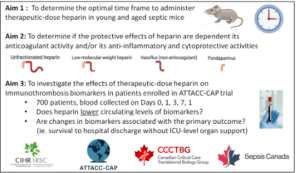Dr. Patricia Liaw and co-investigators receive a new 5-year grant from CIHR ($656K) to investigate the anti-sepsis potential of heparin, a commonly used blood-thinner

Translational studies of heparin in sepsis-associated immunothrombosis
Why is this research important?
Sepsis (ie. life-threatening infections) is a leading cause of death in intensive care unit (ICU) patients. Sepsis can cause a vicious cycle of inflammation, blood clotting, and cell death which may lead to multiple organ failure and even death. Despite decades of sepsis research, there are no anti-sepsis drugs and the mortality rate of sepsis remains high (up to 30%). Given the extensive biological crosstalk between infection, blood clotting, inflammation, and cell death, there has been renewed interest in heparin as a potential anti-sepsis therapy. In addition to its blood thinner activities, heparin can also reduce inflammation and prevent cell death. Recent studies in COVID-related sepsis suggests that heparin can improve outcome in mildly ill patients but not in severely ill patients. Thus, we hypothesize that the beneficial effect of heparin in sepsis may depend on the time of administration of this drug.
How will you use this funding?
In this study, we will use an animal model of sepsis to identify the optimal time frame to administer heparin that will improve survival. We will study four different heparin variants which differ in their size and/or blood thinner activities. These studies may reveal if the protective effect of heparin requires its blood thinning activity and/or its anti-inflammatory and cell-protective properties. In parallel with the animal studies, we will study blood samples from patients enrolled in the ATTACC-CAP clinical trial. This is an international open-label randomized controlled trail to compare the effects of high-dose heparin versus usual care low-dose blood thinners in patients with severe lung infections. By studying blood biomarkers in this patient population, we will gain new biological insights in whether high-dose heparin will improve outcome by reducing inflammation, blood clotting, and cell death.
How will your research advance the field?
Our research will improve our understanding of how heparin can improve outcome in patients with sepsis. This research has a direct pathway to implemental in clinical practice since heparins are inexpensive, widely available, and commonly used in medicine.
Visual abstract of the research questions

Related News
News Listing

Trigatti Lab receives CIHR grant to investigate new pathways involved in coronary artery disease
New Grants
September 24, 2024

